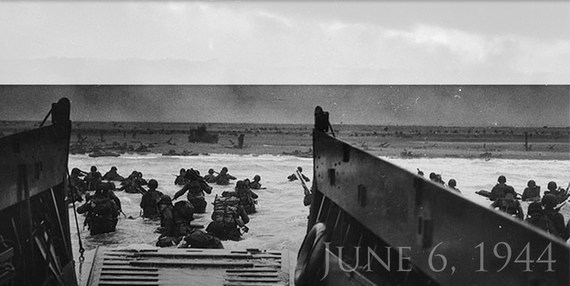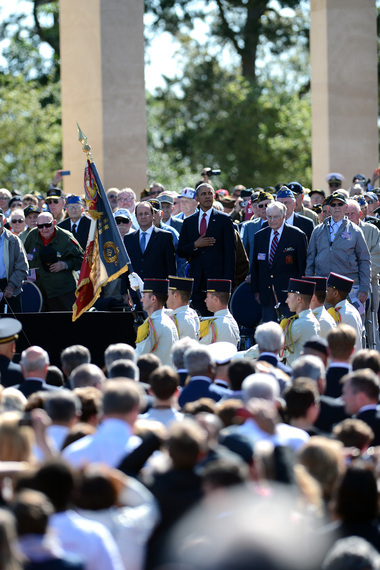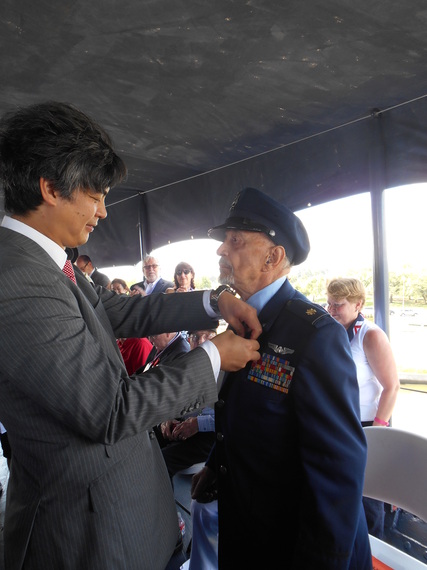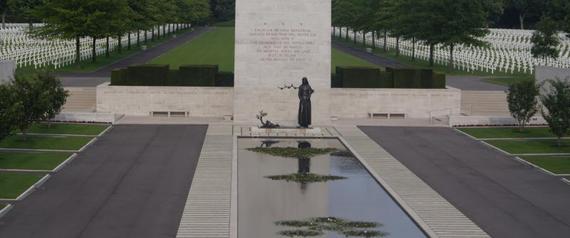...and if you need an old man to clean your shoes and toilets where[ever] you are in the world to keep the freedom, I will be ready tomorrow morning to do that...
These are the words spoken by a 78-year-old gentleman from the small town of Perlé in the Grand Duchy of Luxembourg.
The Luxembourgian is addressing these words to American servicemen who helped liberate his country in World War II and to all members of the U.S. military who today continue to "keep the freedom" around the world.
The gratitude expressed by Roger Feller to the World War II allies, especially Americans, who fought so hard and sacrificed so much to liberate his homeland and all of Europe, is a common and frequent phenomenon in Europe, especially among those of Feller's generation.
We saw and heard such firsthand while traveling though France a few years ago.
We saw it in the many monuments, memorials and other expressions of gratitude -- in small hamlets, towns, big cities and throughout the beautiful French countryside -- for the "Liberators" who gave their lives in so many battles and missions on French soil and in the skies above.
We saw it in a small memorial we came across on the side of a narrow, winding road, "in the middle of nowhere," as we would say here in America, in memory of the crew of an American B-17 bomber that had crashed there in July 1944 at the start of a bombing run intended to destroy a strategic bridge over the Loire River in German-occupied France.
Persac monument (Photo by author)
In 1998, the people of nearby Persac erected a simple monument at the site of the crash in honor of the American heroes. Etched on a white-stone, cylindrical column are the names, ranks and duty titles of the seven young Americans who died and of the two who survived that morning exactly 71 years ago. A pot with beautiful, freshly cut flowers is always present at the memorial.
The world saw this during the 70th anniversary of the invasion of Normandy last year when Europe pulled out all stops to solemnly remember, honor and memorialize the more than 150,000 brave troops who swam, waded or crawled through the cold, choppy North Sea waters to set foot on those five, now almost sacred beaches -- Utah, Omaha, Gold, Juno and Sword -- and the nearly 20,000 men who parachuted from above during the largest amphibious landings and airborne operations mankind had ever seen.
French President Francois Hollande and U.S. President Barack Obama render honors at the Normandy American Cemetery during a ceremony commemorating the 70th anniversary of D-Day in Normandy.(DOD photo by Marvin Lynchar)
It was also evident when, on the 60th anniversary of D-Day, the President of the French Republic approved the award of the medal of Chevalier in the French Order of the Legion of Honor (Ordre National de la Légion d'Honneur) -- France's highest, most prestigious decoration for merit or bravery -- to American World War II veterans who fought in those battles and who helped liberate France from the Nazis.
World War II B-17 bombardier John Tschirhart receives the French Legion of Honor Medal from the Consul General of France in Houston, the Honorable Sujiro Seam, aboard the Battleship Texas in June 2014. (Photo by author)
It continues to be evident in the displays of humaneness, kindness and gratitude by Europeans who "adopt," look after and honor tens of thousands of graves of American soldiers killed during World War II and who now rest in a score of American military cemeteries throughout Europe.
This past Memorial Day, a ceremony was held at the World War II Netherlands American Cemetery at Margraten, the Netherlands. The Washington Post describes how the Dutch "haven't forgotten:
For 70 years, the Dutch have come to a verdant U.S. cemetery outside this small village to care for the graves of Americans killed in World War II.
On Sunday, they came again, bearing Memorial Day bouquets for men and women they never knew, but whose 8,300 headstones the people of the Netherlands have adopted as their own.
The Post points out that that each grave at the Margraten cemetery has been adopted by a Dutch, Belgian or German family, as well as "local schools, companies and military organizations," and that more than 100 people are on the waiting list to adopt a grave.
When we visited Margraten recently we saw with our own eyes how the Dutch honor and revere our war death and how grateful Europeans are to the American Liberators.
The World War II American Cemetery at Margraten, the Netherlands. (Photo by author)
I was reminded of all this by the words of Luxembourgian Roger Feller who, as a young boy, on July 2, 1944 witnessed the collision of two B-17 Flying Fortress bombers over his small hometown in Luxembourg and who, since then, has "dedicated his life to never forgetting the American sacrifices of World War II."
Please listen to Mr. Feller's words in a video released by the Defense Department, below.
Lead photo: Soldiers wade ashore a Normandy beach during the Allied invasion of Europe on D-Day, June 6, 1944. (Photo courtesy U.S. Army)
Follow Dorian de Wind on Twitter: www.twitter.com/ddewind99




